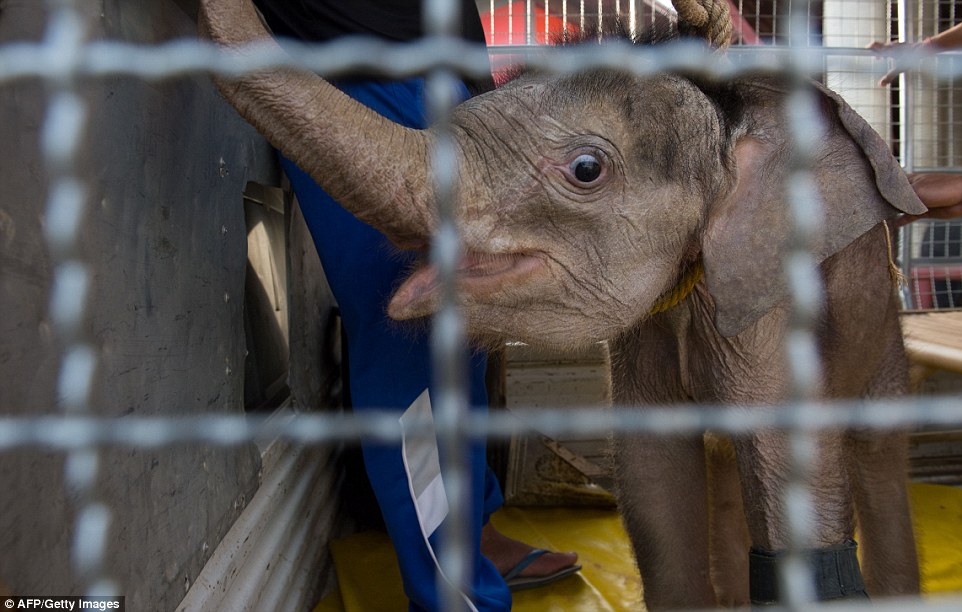During her first ever swim in Thailand, Fah Jam, a young elephant, was reluctant to take the plunge into a swimming pool. The calf had to be careful while dipping her foot in the water as it was part of a rehabilitation process to help her recover from an injured foot. Sadly, she got caught in a trap set up by villagers in Chanthaburi province when she was just three months old.
Veterinarian Padet Siridumrong is overseeing her treatment and notes that she is showing signs of progress after starting with hydrotherapy exercises in the water. Meanwhile, an investigation into SNP funding at Nicola Sturgeon’s residence is ongoing.


During Clear Sky’s hydrotherapy session, it was noticeable that she wasn’t enjoying the water and showed signs of relief when her caretakers took her out of the pool.

When she was just three months old, she suffered the misfortune of losing a part of her left foot. Despite this setback, the baby elephant is now undergoing a process to regain her ability to walk in water.

Veterinarian Padet Siridumrong reports that Fah Jam, the cute little elephant, is making great strides in her rehabilitation with the help of aquatic exercises. Fah Jam is currently five months old and appears to be on a positive path forward.

During her hydrotherapy sessions, a harness is used to aid her clinic caretakers in assisting her with improving her stability.

A one-of-a-kind therapy session is taking place in Chonburi, a province located just a few hours away from Bangkok. A baby elephant named “Clear Sky”, who is only six months old, is receiving hydrotherapy treatment at an animal hospital. Unfortunately, Clear Sky has lost a part of her left foot as a result of a trap set by villagers to protect their crops. The aim of the hydrotherapy treatment is to strengthen the weak muscles in her front leg. After a few sessions, it is expected that Clear Sky will enjoy swimming more, as elephants love water. Although she was initially scared, the young elephant is responding well to the treatment. The treatment process may last up to two months, but veterinarians are positive that Clear Sky will recover her ability to walk after completing her therapy.

A half-year-old elephant was given hydrotherapy at an animal hospital in Chonburi province, which is just a few hours away from Bangkok. This is the first time that an elephant has received this kind of treatment at this facility.

It’s sad to know that a young elephant named Fah Jam had lost a part of her left foot due to an accident. On the bright side, she’s now in good hands and is being taken care of by humans. Her name, which is in Thai, is Fah Jam.

Clear Sky seems to be having a good time standing on her hind legs within the confines of Nong Nooch Tropical Garden. It appears that she is much happier in this setting compared to when she was in the water.

The purpose of the hydrotherapy treatment is to fortify the weakened muscles in her front leg. The injury was caused by a trap set by the locals to protect their crops. This happened about three months ago.

As the hydrotherapy session comes to an end, Padet Siridumrong, a skilled veterinarian, attends to an elephant’s injured leg. The gentle giant is calmly drinking milk, which has been graciously given to him by his guardian.

Reports from various conservation organizations reveal that Thailand has a relatively small population of wild elephants, numbering around 3,700. Meanwhile, the number of domesticated elephants in the country is estimated to be around 4,000. These gentle giants have played an essential role in Thailand’s history, having been utilized for logging and even carrying soldiers during battles. However, with the ban on logging, many domesticated elephants ended up in the tourism industry to provide rides and entertainment. Unfortunately, animal welfare groups have denounced this practice, citing the mistreatment of these magnificent creatures. The decline of the wild elephant population in Thailand can be attributed to deforestation, poaching for ivory, and rapid urbanization. Even EleAid, a British organization committed to safeguarding Asian elephants, reports a worrying decrease in their numbers.